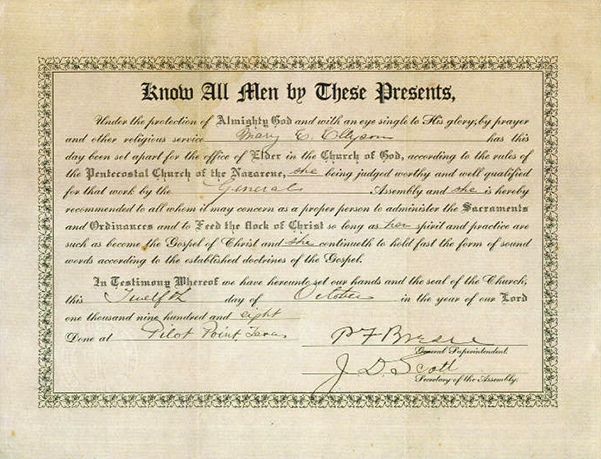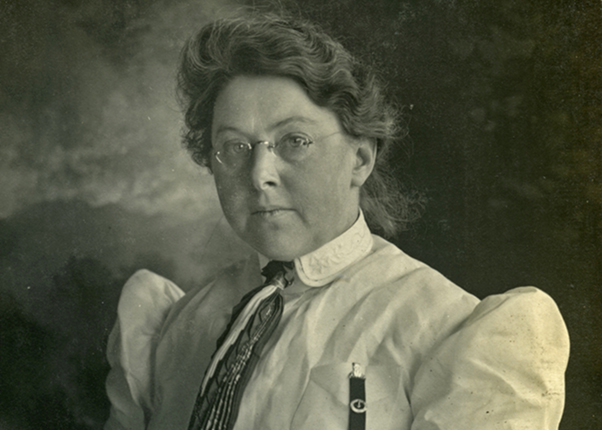Written by Stan Ingersol
From his column Past to Present

“Know all Men by These Presents, Under the protection of Almighty God and with a single eye to His glory, by prayer and other religious service, Mary E. Ellyson has this day been set apart for the office of Elder in the Church of God, according to the rules of the Pentecostal Church of the Nazarene.” So reads the credential of Mary Emily Ellyson, ordained by Phineas Bresee at the General Assembly at Pilot Point, Texas, in 1908.
The ordination service is one of the most sacred moments. Ordinands kneel at the altar rail. The presiding general superintendent lays hands on each and commissions him or her. Other ordained ministers join in laying on hands. But notice the precise words used in the charge: they are not ordained “a minister in the Church of the Nazarene” but “a minister in the Church of God.”
The crucial distinction goes to the heart of what we profess and believe about the Christian church. Every Manual published by the Church of the Nazarene has contained a short section titled “The Church” which states three convictions.

First, the Church of God is composed of all spiritually regenerate persons. Second, the churches severally (individually) are composed of those who voluntarily associate for Christian work under a specific faith and order. Third, the Church of the Nazarene is composed of Christians who have joined according to its Wesleyan doctrines and polity. These convictions affirm that the Church of the Nazarene is one—but only one—expression of Christ’s Universal Church.
What are some ways in which we see ourselves as part of the Universal Church?
The Manual’s Historical Statement indicates some of these. It reads: “As its own people, [the Church of the Nazarene] embraces the people of God through the ages . . . in whatever expression of the one church they may be found.” Our denomination is only a century and a quarter old, but our people—the “people of God”—have been around for thousands of years.
“It receives the ecumenical creeds of the first five Christian centuries as expressions of its own faith.” The early creeds are affirmed by nearly all Christians and set forth fundamental convictions related to Trinitarian theology and the divine-human nature of Christ.
The Historical Statement notes that Nazarenes have nurtured “identification with the historic church” by preaching the word, administering the sacraments, raising a ministry that is apostolic in faith and practice, and inculcating disciplines of Christ-like living and service.
John Wesley modeled how Christians should engage the wider Church. Wesley’s denomination was the Church of England. Yet he believed strongly that the spiritual and theological wealth of the entire Christian Church was available to him and his followers. Wesley edited and published “The Christian Library,” a series of spiritual works. The writers he chose ran the gamut of Christian opinion. He included Roman Catholics like Pascal, Molinus, and Archbishop Fenelon—men noted for their devotional writings. He included representatives of Eastern Christianity, such as Ignatius of Antioch, Polycarp, and Macarius. And he included works by Protestants of many stripes: Philip Melancthon, a Lutheran; John Owen, a Puritan; John Bunyan, a Baptist; and writers from his own Anglican communion.
Wesley’s attitude toward Christians in other denominations was spelled out in his sermon “Catholic Spirit.” He wrote: “There is a peculiar love which we owe to those that love God.” There are many different opinions and styles of worship in the Christian world, and these prevent the organic union of all Christians. But should these things “prevent our union in affection?” he asks. “Though we cannot think alike, may we not love alike? May we not be of one heart, though we are not of one opinion?” Near the sermon’s conclusion, he states that we bear “with those who differ from [us, asking only this] . . . “Is thy heart right, as my heart is with thy heart?”
As a church in the Wesleyan tradition, Nazarenes are heirs of this basic attitude.
Nazarenes have expressed solidarity with other Christians through participation in interchurch organizations. These have included the Christian Holiness Association, the National Association of Evangelicals, the World Methodist Council, and the Global Wesleyan Alliance. There are countless other ways that we participate with other Christians, such as World Communion Sunday, the American Bible Society, and local ministerial associations. NCM International often works in tandem with other Christian social ministries.
Wesley was right: there is a special love Christians ought to bear for others who bear Christ’s name. The Nazarenes are a holiness people and a missional people. First, though, we are a Christian people.
Stan Ingersol, Ph.D., is former manager of archives for the Church of the Nazarene.
